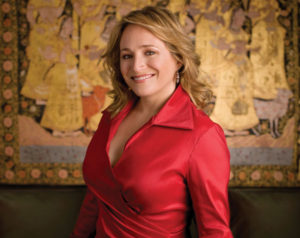
Opera America Conference 2018: Star Soprano-Turned-Director Patricia Racette Leads Discussion On Career Transitions
By Santosh VenkataramanOver the next few days, Santosh Venkataraman will be attending the Opera America Conference from St. Louis, providing us with in-depth coverage of some of the major events. Stay tuned!
Patricia Racette recalled an email she got after the announcement was made that she would be making her directorial debut at Opera Theatre of St. Louis this summer with La Traviata.
It wasn’t exactly a note of thanks or many words at that. She claims she got a message that simply had a question mark.
Racette told this story at the Career Transitions for Artists panel at Opera Conference 2018, hosted by Opera America along with Opera Theatre of St. Louis. It was part of a spirited discussion about how artists can transition once their performing careers are done. Racette isn’t finished yet, as she showed last season when she appeared in “The Consul” at Chicago Opera Theater, but she was eager to prove herself elsewhere.
Of course, not every singer will have a career as illustrious as the celebrated soprano. That’s what Anne-Carolyn Bird, now an artistic and executive assistant at Washington National Opera, explained about what she realized when her children were eight and three years old, respectively.
Bird said she had “been on stage since she was 10-years-old.” But realizing the stresses and strains her career was putting on her family, she decided that she would either “have to go higher” within her performing career or move on. She made the latter choice.
The question is what comes next. And teaching may be a natural fit but may not be the right one.
“It is unspoken that you are done singing, you are going to teach now,” Racette said. “And that’s not for everyone.”
Offering more pointed advice was Jeri Sedlar, a career transitions expert and the author of the book “Don’t Retire, Rewire!”
“Know why you want to make a transition,” Sedlar said. “You really have to find yourself in these moments.”
Making the Transition
Sedlar said that writing down your achievements in 5-year chunks helps give a better sense of what you have accomplished and what may pique your interest in the near future.
Seeing yourself in a different role can be daunting. The pressure to perform is so intrinsic that many singers look at administrative opportunities “as the dark side,” according to panelist Robert McNichols Jr., D.M.A. Associate Professor of Music at Harris-Stowe State University.
Many performers also may not feel so confident in their abilities outside of the stage. Yet Sedlar believes that the discipline and focus required as an artist translates well to other endeavors.
Nathan DePoint, the director of operations at Austin Opera, noted that “trust, communication, creativity and collaboration” are all developed as artists and work as well in an office setting as in a rehearsal room. Other qualities transfer as well.
“I have a huge backpack of skills and one of them is to get what I want,” Bird said. “There is something for everyone.”
The conversion from the artistic side to the administrative one can be natural because performers have enjoyed a birds-eye view of the business side of operations. Racette noted the complexities involved in opera and called it a “collision of virtuosic endeavors on so many levels.”
Applicable to Everyone
While this discussion was about performers, the applications were universal for anyone in a transition phase in this time of economic upheaval and job uncertainty. Gone are the days in general of signing on for 30-plus years with any company in any field.
Making such a change can be arduous mentally and isolating, something familiar for performers who are used to dealing with loneliness. Racette said that feeling of being alone requires people seeking a new phase to have a “nugget of self-belief.”
Yet another aspect of that experience of going solo may actually pay dividends down the road in terms of knowing how to get things done.
“We are our own businesses,” Racette said. “We are not only the CEO but the product.”
Notable too is that no matter how fearless singers may feel in front of an audience they feel the same trepidation as anyone else when faced with a new set of circumstances. That was echoed by singers faced with writing a grant letter. Racette felt that directing was natural or as she put it, “It’s been said that I’ve been accused of directing already.”
When Racette said that she took umbrage at the fact that people who can’t sing yet teach voice sometimes question the post-career choices of singers, Sedlar had an interesting response. It was that those people had the drive and determination to establish themselves in a situation in which they may not have seem suited.
Another point stressed by Sedlar was that just because you have extensive experience doing something doesn’t mean it should automatically go to the top of your resume if it’s not what you want to do in the future. It’s more important to determine what you really want to do next.
“At the foundation of this, you have to love this,” said Racette about finding the next step.
Categories
Special Features

